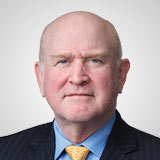Unilever (UL) is an Anglo-Dutch consumer products company, which derives over 60% of its revenues from emerging and frontier markets and whose brands include such well-known names as Hellmann’s mayonnaise, Dove shampoo and deodorants, and Ben and Jerry’s ice-cream, notes Gavin Graham, contributing editor to The Income Investor.
The company made an abortive attempt to purchase the consumer pharmaceutical business from GlaxoSmithKline (GSK) for £50 billion in January, causing investors to react with dismay to this distraction.
Investors also turned thumbs-down on Unilever’s obsession with nebulous concepts such as finding “missions” for its products rather than concentrating on making its business more efficient and increasing margins.
Enter activist investor Nelson Peltz. His Trian Capital had taken a stake in 2018 in Procter & Gamble (PG), another old established somewhat bureaucratic consumer group, and succeeded in improving its performance substantially. Trian revealed a 1.5% stake in Unilever in the first quarter and took a board seat in May.
In the first quarter of 2022, ended March 31, turnover grew 11.8%, to €13.8 billion. Emerging markets were up 9.5% while developed markets grew 4.1%. North America grew 8.5%, while Europe saw essentially flat sales at 0.7%. Underlying sales growth was 7.3, with Home Care up 9.2%, Beauty and Personal care up 7.2%, and Food and Refreshment ahead 6.5%.
Unilever completed the sale of its tea business to CVC Capital Partners for €4.5 billion and bought back €750 million worth of shares, showing CEO Alan Jope is attempting to slim down the portfolio. Doubtless, Mr. Peltz’s presence will lead to faster action.
With the shares off 30% from their high in 2019 against a 3% rise in the FTSE 100, some action to reshape the portfolio was necessary. Management has been distracted by the attempt to relocate the headquarters to the Netherlands (now abandoned) and the pursuit of politically correct initiatives.
The sharp rise in the price of P&G after Mr. Peltz’s arrival holds out hope for Unilever. It is again rated as a Buy, as it is able to pass on the large increase in raw material costs through price rises.










